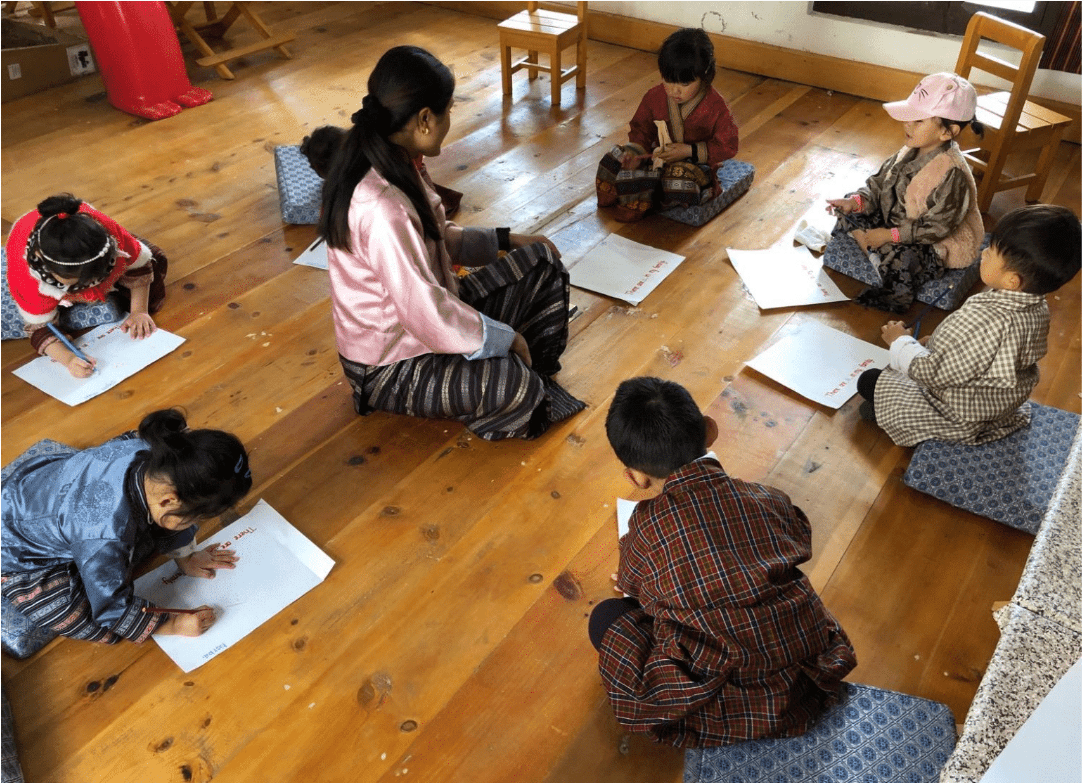University of New England’s School of Education, in collaboration with Bhutan’s Paro College of Education, has developed a new demonstration school to support and enhance Bhutan’s early childhood teacher education programs.
Dr Margaret Brooks, UNE Senior Lecturer in Early Childhood Education, has just returned from Bhutan, where she has been working with the Royal University of Bhutan (RUB) Paro College of Education’s first early childhood education students and staff utilising the training school.
“Early childhood education is a brand new concept in the Bhutanese education system, which may be hard for Australians to imagine!
“Traditionally in Bhutan, there wasn’t a need for childcare centres or preschools; young children stayed in the home until they were old enough to go to school. But this is changing as families are starting to move from villages to urban centres.
“More than that, as Bhutan’s leaders look to international models of education, they have been convinced of the value of formalising education in these early childhood years for creative, intellectual and social development, and have been looking to introduce early childhood training into their teaching programs since 2007,” Margaret says.
Royal University of Bhutan’s Paro College of Education began to make that dream a reality when a two-year tender, funded by UNICEF, was opened to New Zealand, Canada and Australia. UNE was successful in winning the tender to develop the college’s early childhood education courses from 2014 to 2016, and later set up the demonstration school where student teachers can learn on the job.
“I had run demonstration schools before, so I proposed a multipurpose centre with preschool, infant and toddler and parenting and health programs. Paro College was really supportive of this plan, and I spent all of August 2018 and April 2019 setting up the centre for the first stage: preschool education.
Setting up a demonstration school in Bhutan had its unique challenges.
“All training and everything in the centre has been carefully considered to ensure it’s culturally relevant and appropriate for Bhutan. Everything has to align with Bhutan’s underpinning principles of Gross National Happiness (GNH) and everything in the centre has to accurately reflect what happens in the home,” Margaret says.
“For example Bhutanese children don’t usually sit at a high table to work or eat at home, so we’ve mirrored that in the set-up of the centre. Bhutanese kitchens are also very different, so we’ve incorporated that into the play area so it looks and functions like a home.”
As well as setting up the centre, Margaret has been working with the first early childhood teachers coming through Paro College’s brand new early childhood education program.
“I’ve been working with two wonderful teachers over there who have really embraced a shift from teaching from the front of the room to the holistic, interactive style of teaching that’s central to the early childhood program.
“Culture and resourcing are really important considerations in everything we’re doing. It’s really important to the Bhutanese that everything used in the centre is sustainable and from nature or produced non-commercially.
“The children learn a lot from the world around them. They are guided to carefully observe and draw things they see, and recreate these things from natural materials they collect.”
Margaret says inviting parents to be involved in the early childhood education centre has been a cultural shift.
“In Bhutan, parents have a reverential attitude towards teachers. But that means they’ll often keep their distance from school activity, to leave education up to the experts.
“We’re trying to break down that barrier with the design and activities of the centre, keeping parents up to date and involved with what their kids are learning. The teachers and I have been creating pictorial narratives on the walls in the foyer where the parents meet, depicting what the students have been learning. We also designed the centre with open spaces and glass walls to encourage this interaction,” Margaret says.
Margaret says Paro College of Education’s President, Dr Dorji Thinley, has been extremely supportive and is very proud of what they’ve achieved for their teacher education programs.
“Dorji has been incredibly accessible and listened to all ideas and concerns, such as the need to provide mentoring and keeping teachers at the centre for as long as possible to provide continuity of learning at the centre.
“He likes to say the Early Childhood Centre is the jewel in the crown of the Paro College of Education!”
The Royal Government of Bhutan has outlined a number of goals to improve early childhood care and development access for all children aged three to five years over 10 years, with a target of 50 per cent by 2024, one early childhood education centre for every village by 2028, and universal by 2030.



That’s a good idea to improve the early childhood care and development.